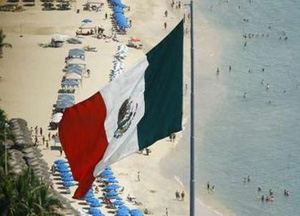 |
 |
 |
 Travel & Outdoors | February 2007 Travel & Outdoors | February 2007  
Federal Police to Permanently Guard Acapulco Hotels
 Greg Brosnan - Reuters Greg Brosnan - Reuters


| | A Mexican flag flies above a beach in the resort town of Acapulco February 23, 2007. (Reuters/Andrew Winning) |
Mexican federal police will patrol the hotel zone of Acapulco day and night to prevent an outbreak of drug gang violence from affecting tourism, a senior police official said on Friday.

Acapulco, a former playground for Hollywood stars that has long been in decline, is one of the main battlefields in a war between Mexico's two main drug cartels.

Two thousand people were killed nationwide last year, including two policemen who were decapitated, their heads displayed outside a government building in Acapulco.

Federal police, backed by municipal and state forces, mounted roadblocks on Friday on the main "Costera" beachfront road, searching public buses and frisking passengers for drugs and weapons.

"This area is totally dedicated to tourism and commerce and is vital for Acapulco. We are going to keep this beach area safe. ... We are going to rescue it," said Ernesto Fernandez, a federal police commissioner.

New President Felipe Calderon has sent thousands of troops to the state of Guerrero, where Acapulco lies, and drug hotspots like the U.S. border city of Tijuana and the western state of Michoacan in a nationwide anti-drug push.

"It won't be like in Michoacan or Tijuana, where they arrive and then leave. Here it will be permanent," said Fernandez, who controls a joint police and military anti-drug operation in Guerrero.

Soldiers operate checkpoints on the edge of Acapulco, home to a sweeping horseshoe-shaped bay of golden sand crowned by lush green hills and the economic engine of the poor, mountainous state of Guerrero.

The resort is moving into one of its peak tourism periods, with U.S. Spring break student vacationers arriving and Easter approaching.

Drug violence has recently spread to the resort as cartels battle over control of shipments of cocaine to the United States and a growing local market.

"Organized crime is like dough. When you squeeze it on one side it pops out of the other," said Fernandez. "That's what happened with drug-traffickers in Guerrero state. They started to make themselves at home. ... They tried to take control."

Despite the crackdown, drug hit men killed seven people in a brazen attack on two police stations in Acapulco on February 7.

Scores of black-clad federal police with assault guns at their sides searched passing vehicles on Friday, singling out the large SUVs and pickup-trucks with darkened windows often used by drug gunmen, or "sicarios."

Foreign and Mexican tourists were unfazed by the police build-up.

"It's fine with me," said Canadian tourist Debbie Knoll, 53, strolling with her husband past a checkpoint, where police waved and greeted them in broken English. "It makes me feel comfortable." | 
 | |
 |



